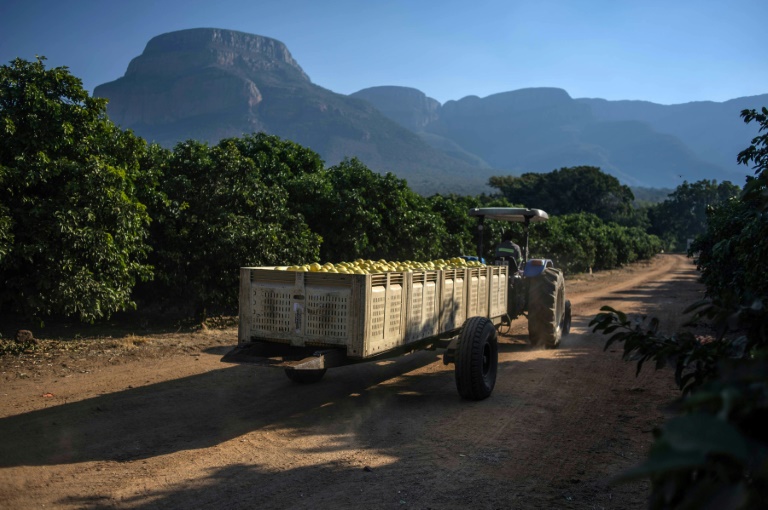Proteas announce ODI squad vs Pakistan: Maphaka earns ODI call-up
After a 10-year legal battle, the Moletele have taken back the land from which they were evicted by members of the white minority nearly a century ago.
The area, a picturesque range at the foot of mountains near Hoedspruit in the country’s northeast, is dotted with trees heavy with fruit.
“To us, we see it as our dignity has been restored,” said Hezekiel Nkosi, the chairman of the Moletele Communal Property Association which pressed the claim.
“We are making sure that our people work on the farm and make it successful.”
Nearly a quarter of a century after the end of apartheid, the sensitive issue of redistributing land to South Africa’s black majority looms large over the country’s politics.
The leader of the radical leftist Economic Freedom Fighters party, the firebrand Julius Malema who has been convicted of hate speech, has called on his followers to forcibly seize land.
Even President Jacob Zuma has called for land “expropriation without compensation” as part of a push for “radical transformation” of the economy which remains largely in the hands of the white minority.
Since Nelson Mandela swept to the presidency on a wave of optimism in 1994, ownership of farmland has barely altered — with just three percent changing hands since then, according to the Department of Rural Development.
Often, land transfers end in failure with new owners walking away from their investments after struggling to turn a profit.
The Moletele community itself came close to disaster after 1,615 families took over the area of 70,000 hectares (173,000 acres) that was found to be theirs in 2007.
“Those who were denied the opportunity to participate in the economy must now be enabled to be the key role players,” said then land minister Lulama Xingwana.
But because of a lack of cash, training and limited market access, the hopes of the Moletele quickly turned to despair.
“Farming was very difficult because we have to pay for inputs such as fertilisers or electricity. All costs — but we didn’t have money,” recalls Nkosi.
“So we advertised for people who could assist in running the farm.”
– Racial partnership –

Matuma Farms chief executive Pieter Scholtz is alarmed by talk of forced land redistribution in South Africa
And in a striking breakthrough for race relations in the country, their call was answered by white farmers.
The Moletele agreed to pay a percentage of the land’s revenues over 20 years to the established local farmer in return for expertise.
Following the deal, the former landowners became the workers while the one-time labourers became the bosses.
And against the odds, the arrangement was a success.
“When we took over the farm, there was really nothing going on there, it was totally neglected,” said farmer Duo Landman.
“What we did is we took our practices from our own farms and just implemented them. Now it’s definitely profitable.”
The Moleteles’ venture has since benefitted from their partners’ know-how, their processing facilities and their extensive distribution networks.
Their lemons and mangoes are sold at home and abroad and helped the black-led enterprise to report its first profits.
“Here we have an example of successful land reform,” said Pieter Scholtz, chief executive of the operation, Matuma Farms.
“Seventy percent of the land belongs to the people of the Moletele community,” he added.
“It’s really about having good relationships with the community and creating jobs, giving back through business schemes and training.”
– ‘An emotive issue’ –

Lemons and mangoes from the Moletele farm are now sold at home and abroad
Scholtz is delighted with the partnership underpinning the success of the business, but is alarmed at Zuma’s talk of forcibly redistributing land.
“It’s always a concern if your president stands up in the parliament and says things like that, although we believe in the constitution and the quality of our courts,” he said.
Peter Setou, head of the Vumelana foundation that helped the Moletele with their land claim, cautioned against forcible land transfers, warning this could have similar results to Zimbabwe’s disastrous farm seizures.
“Land reform is an emotive issue and the level of frustration among the communities is because the process is exceedingly slow,” he said.
“South Africans will always find creative ways for resolving their issues.”
Nkosi also warned against political posturing, saying: “If you grab land and you don’t have access to the market and you don’t have the technical know-how, then it would be a fruitless exercise.”
In his new role as a manager, he is now plotting his next moves to increase growth — an expansion into livestock.
“The dream is we want to be the best producers of beef in South Africa,” he said.
Download our app and read this and other great stories on the move. Available for Android and iOS.